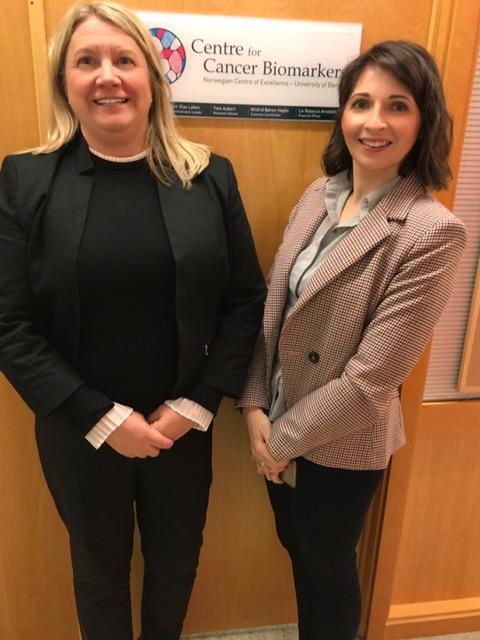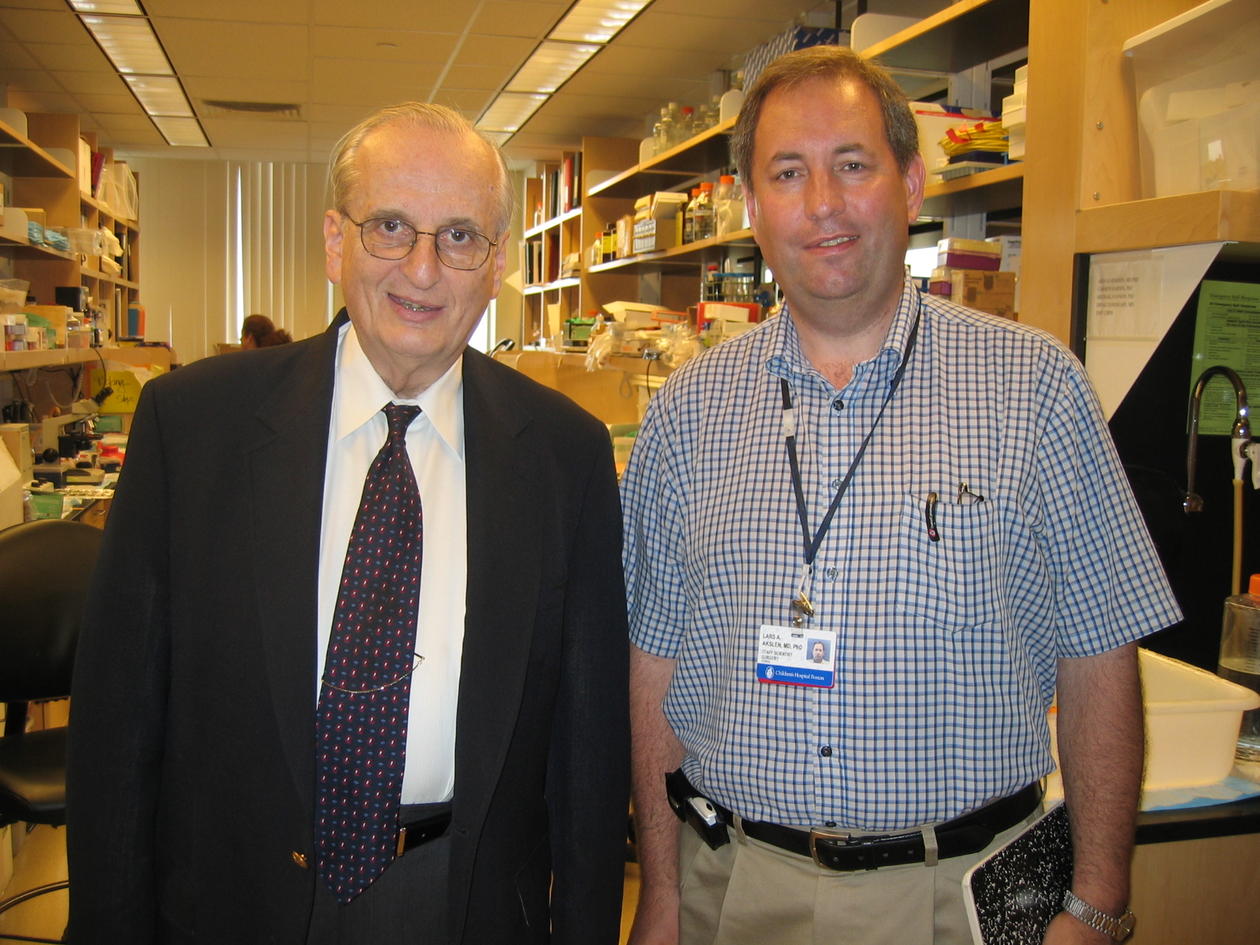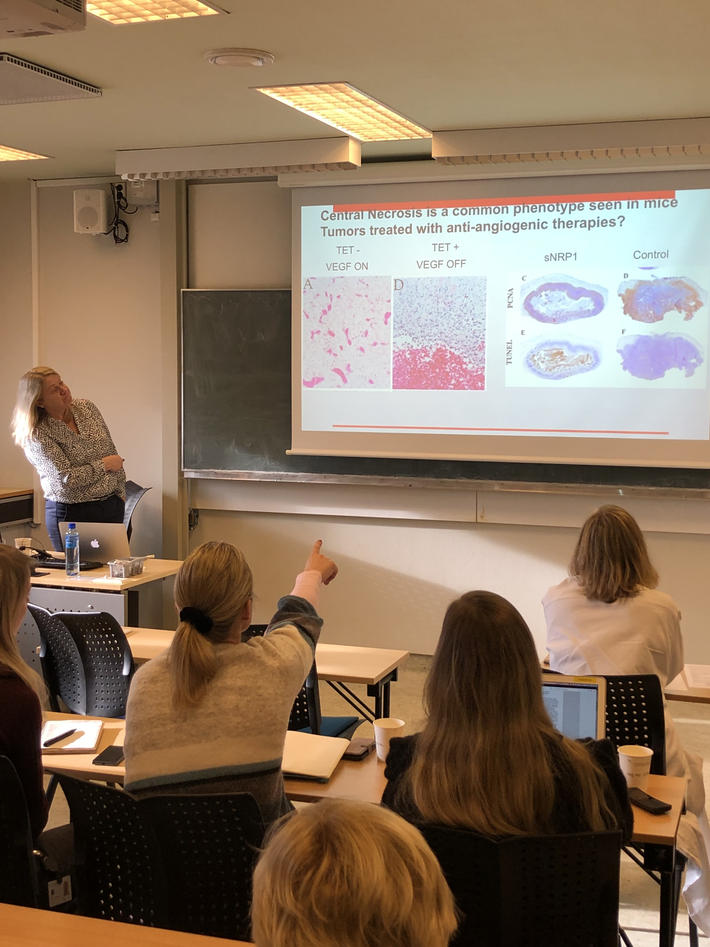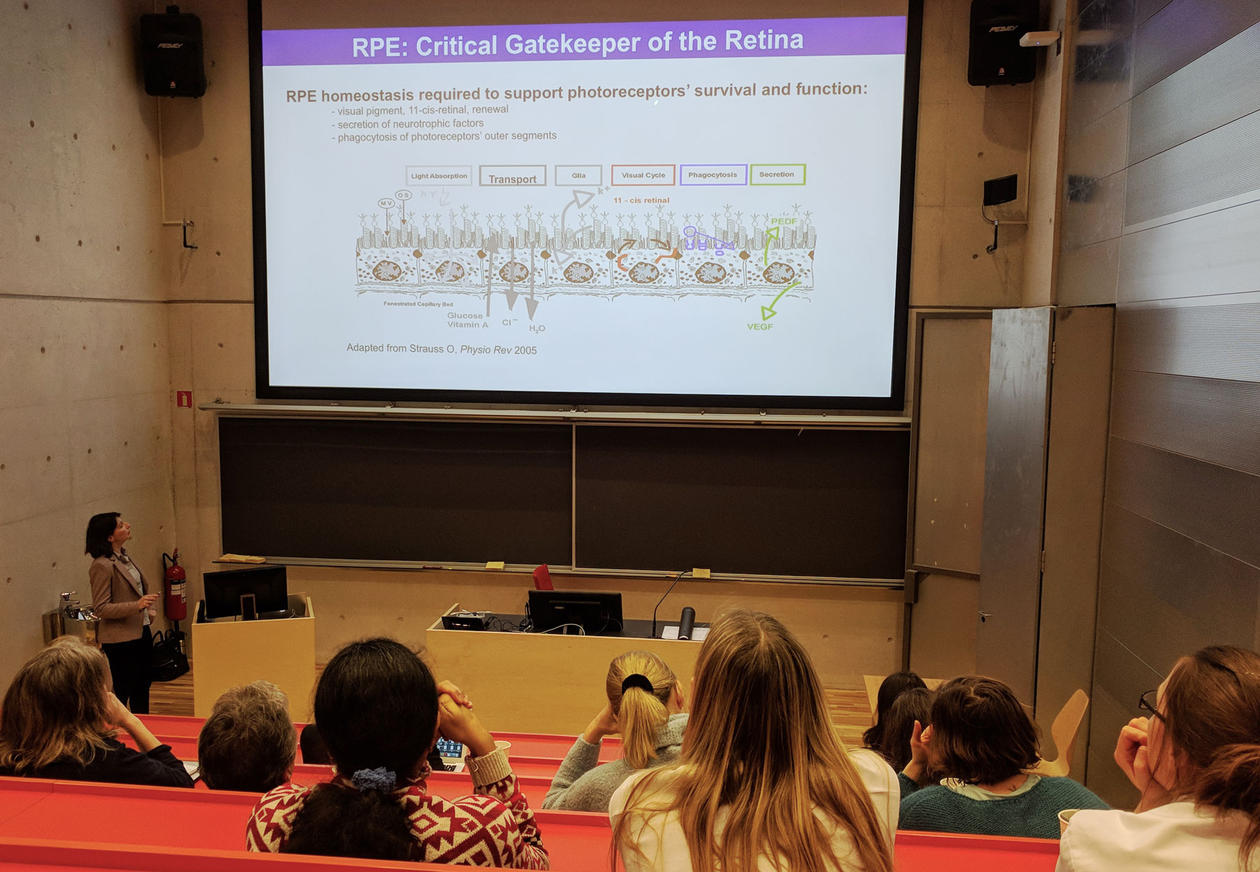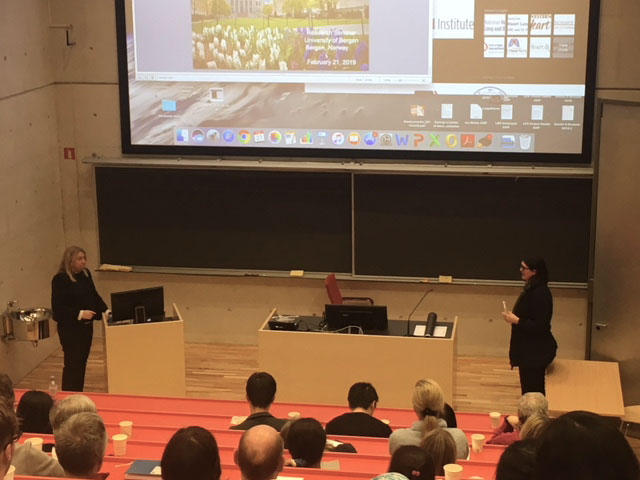Completion of the PhD course CCBIO907 Cancer-Related Vascular Biology
In February, the first CCBIO INTPART long course – CCBIO907 Cancer-Related Vascular Biology – was completed with the final of three course weeks. Assistant Professors Diane Bielenberg, Vascular Biology Program, Boston Children ‘s Hospital, and Magali Saint-Geniez, Schepens Eye Research Institute of Mass. Eye and Ear, Department of Ophthalmology, Harvard Medical School, lectured and tutored the workshop of this third course module.

Hovedinnhold
Setting the standard
Dr. Bielenberg set out with a presentation of the late Dr. Judah Folkman; the ‘father of angiogenesis’ and founder of the Vascular Biology Program at Boston Children’s Hospital, Harvard Medical School. Dr. Folkman’s famous whiteboard was presented; where hypotheses and the important vascular biology related questions were posted, many still unsolved per today. Dr. Bielenberg shared stories from the daily scientific life of Dr. Folkman, and gave us insights into an extraordinary scientist and mentor. This notably set the standard for the week – inspired by Dr. Judah Folkman, and brought forward and supported by Drs. Bielenberg and Saint-Geniez: Curiosity, hard work, and willingness to share from your knowledge and experience.
Inviting and sharing
Drs. Bielenberg and Saint-Geniez provided truly inspirational lectures, being highly complementary in terms of professional skills and methods of lecturing. They are both experienced lecturers at Harvard Medical School, and caught the students’ attention and curiosity from the very moment they set out welcoming to the course. The students were clearly inspired, motivated, amused, and scientifically enlightened during this week. The two Harvard doctors lectured with a perfect combination of top-notch professional skills and humbleness for the complexity in biology, and spiced the lectures with an interesting mix of French and Iowan humor, encouraging the students to interact with them as if they were all old friends.
The lecturers took the students back to the basics of vascular biology, now with new perspectives; focusing on tissue-based assessment of vascular biology, bringing up histology slides for mini quizzes and small-group discussions, and reminding the students to keep in mind the important histobiologic principle: form follows function. Further, views on experimental vascular biology models, metabolic control and alterations in angiogenesis, and VEGF receptors and neuropilin endothelial signaling, were thoroughly presented. Dr. Bielenberg included several tips on pitfalls and suggested best practices, as well as the important know-hows when working on mice. Both Bielenberg’s and Saint-Geniez’ lectures were full of the kind of tips you can only get from very experienced researchers, something that was highly appreciated by the students.
Open research seminars
Both Drs. Bielenberg and Saint-Geniez gave open research seminars during the course week. Dr. Saint-Geniez’ introduced the retina and retinal pathology in her seminar “Shining light on the metabolic control of retinal diseases”, and brought the audience into the depth of metabolic programming and dysfunctions, leading to transdifferentiation, and demonstrating plasticity in retinal pigment epithelial (REP) cells. Saint-Geniez further elucidated how PGC-1α is considered a core regulator of RPE mitochondrial function, and highlighted the role of oxidative metabolism and mitochondrial health in controlling RPE phenotype and retinal functions.
Dr. Bielenberg presented data on targeting neuropilin pathways to inhibit metastasis. She also presented parts of the many sub-projects she has been heading, focusing on vascular biology and neuropilin signaling. She gave the audience glimpses of vast amounts of basic and translational forefront research in the field of angiogenesis, lymphangiogenesis, and introduced SEMA3F as a promising target in novel antiangiogenic and anti-metastatic treatment strategies.
Branding your science
As part of the course program, Drs. Bielenberg and Saint-Geniez designed a workshop providing valuable and readily implementable tools to increase individual marketability through personal and science branding.
Dr. Saint-Geniez visualized one of her messages: “Branding for an individual shares similar goal as for business: to ensure that the right persons see the right thing when they look at you.” She further elaborated: “When branding the professional you, and branding your science, you have to highlight unique and special features that would particularly appeal to a potential recruiter or collaborator.”
“Building a powerful personal brand is a long-term effort that can give you a great edge in a competitive market.” This was one of the key messages from this workshop, where the students were given valuable tools and an opportunity to get their personal branding started. In the second part of the workshop, the students were thrown into an exercise of crafting an elevator pitch, improving on it after feedback from their peers and the Harvard lecturers.
Preparing for strong funding proposals
This week’s assignment was a well prepared exercise on funding applications. The students were given a call for funding, and were asked to hand in a 1-2 pages proposal abstract, including title, a rationale for the project under application, aim(s), description of approaches and methods, and clinical significance and innovation. The final course day, the students presented their planned project and proposal, and were questioned by Drs. Bielenberg and Saint-Geniez. The same practice is common in US research project calls; selected applicants are invited for presentations and follow-up questions, whereupon the evaluation committee concludes. The discussions following the students’ presentations were highly valuable. Drs. Bielenberg and Saint-Geniez followed up with plenty of advice on making the funding proposals stronger, willingly sharing their own successes and failures, and their experiences as members of call evaluation panels.
The CCBIO907 course summarized
In collaboration with the Vascular Biology Program, Boston Children’s hospital, we have now completed the first CCBIO INTPART long course CCBIO907. This has been possible through joint efforts requiring resources at both sides of the collaboration. On our side, this has been a unique experience, and we aim to continue the course as a master and PhD course.
Elisabeth Wik, who had the shared academic responsibility for the course, and who organized the course, says: “It has been an extremely pleasant experience to interact with our colleagues from the Vascular Biology Program when setting up this course.” She further tells that they have in the most effortful manner contributed to the weekly program, and additionally by adding the mentoring and career developing workshops and seminars to the curriculum. “The course modules have been as complementary as CCBIO could possibly wish for,” she concludes.
Professor Akslen initiated the collaboration between Medical Faculty, University of Bergen and the Vascular Biology Program when he did a sabbatical year at the Vascular Biology Program in 2004-2005, mentored by Dr. Folkman. As Akslen says: “Judah Folkman was a true scientist, a great mentor and a unique inspirator, and came to mean a lot to me, both scientifically and personally. I am truly happy to see how the link between CCBIO and the Vascular Biology Program at Harvard has been strengthened through the CCBIO-INTPART collaboration.” Akslen further says that he hopes that CCBIO907 and the other collaborative educational and research activities will further strengthen the connections between CCBIO and the Vascular Biology Program, also for the future generations.
Professor Akslen and Dr. Wik would in particular like to thank Professor Marsha Moses, Director of the Vascular Biology Program, for supporting the CCBIO-VBP INTPART program, and for facilitating her PI’s contributions and participation in the course, and not least, for taking responsibility herself for one of the course weeks, including lecturing and speaking at the mentoring seminar. For the students attending the course, she has been a true inspiration for a career in science.
CCBIO would also like to pass warm thanks to the other colleagues from the Vascular Biology Program who made this course a reality. Students and faculty alike, report that the course has been very motivating, inspiring and provided great learning outcome. Adding the mentoring and career developing aspects to the course, gave the curriculum an extra dimension which CCBIO gratefully thanks our Boston colleagues for. Even the methods the Harvard scholars used for teaching, provided inspiration for improved teaching amongst the UiB faculty and students.
To us, it seems as if those who started as juniors in the program of Dr. Judah Folkman, truly has brought his spirit in science and mentoring forward. Thanks for sharing!
